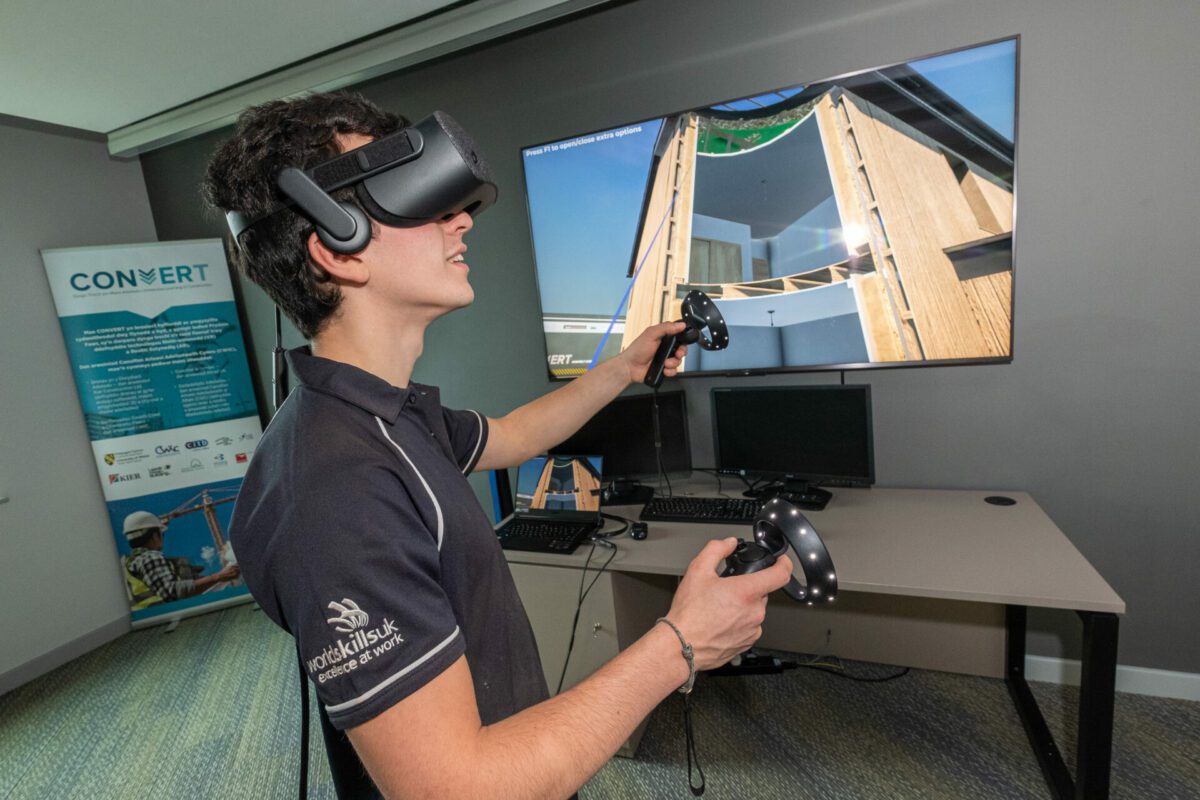Leeds College of Building showcases Virtual Reality construction training for #NAW2022

Piloting a drone over a building site: just one of the latest virtual reality construction training activities that visitors could sample at the Leeds College of Building stand at this year’s Leeds Apprenticeship Recruitment Fair.
The fair marked the start of the 15th annual National Apprenticeship Week (7th-13th February) and showcased a line-up of diverse exhibitors from across sectors. Leeds College of Building invited eventgoers to visit their stand to experience the latest VR technology currently used to teach students various aspects of Construction and the Built Environment.
Leeds College of Building is leading the way nationally in the use of VR learning platforms and over 100 students have already benefitted from using computer-generated construction environments.
Virtual scenarios can include piloting drones for building site mapping and surveying, working at height and with scaffolding, and using virtual tools to simulate spray painting or wood machining. New virtual tunnelling skills and welding skills experiences will be introduced to the curriculum soon.
Wayne Chappelow, Construction Crafts Faculty Director at Leeds College of Building, said:
“Leeds College of Building is committed to be at the forefront of industry developments and adopting new technology to support and enhance our students’ learning experience. Our staff have embraced VR, undertaking their own training to deliver this immersive and interactive mode of learning which is especially engaging for younger students.”
The use of VR technology by students at Leeds College of Building is made possible by CONVERT (Construction Virtual Environment Resource Training), a two-year UK-wide collaborative project led by the Construction Wales Innovation Centre. Leeds College of Building is one of only six institutions across the UK delivering state-of-the-art immersive learning using Virtual Reality and Augmented Reality technologies.
The project results from a £2 million investment made by the Construction Industry Training Board (CITB), which offers innovative and bespoke construction learning resources available to the Further and Higher Education sector throughout the country. The training introduces hard to teach, high-risk skills to learners using immersive learning resources.
John Clancy, curriculum manager in the Leeds College of Building Skills Academy, said:
“The students have really engaged with the software and enjoyed the virtual world in construction. It has certainly enhanced their understanding of the three modules programmed into the headsets: Working at Height, Virtual Building Environment Element Explorer (VBEEE), where they virtually build a property, and the drone surveying training.
“It has been a great addition to the students training that runs alongside their vocational qualifications and certainly compliments and enhances their learning experience at Leeds College of Building.”
Julie Evans, CONVERT Project Manager, said:
“We are pleased to have Leeds College of Building on board as a delivery partner for CONVERT. It provides both lecturers and learners with excellent teaching and learning resources to integrate with their curriculum delivery. We are looking forward to working with all of our delivery partners over the next 12 months to achieve the project’s goal to enhance the learning of 2,440 students UK wide.”
Marcus Bennett, CITB Head of Analysis & Forecasting, added:
“If we get it right, immersive learning has the potential to help revolutionise construction training. As a complement to traditional training, it can help more quickly and cost effectively produce ‘work-ready’ employees, so reducing skills shortages and improving quality, safety, and efficiency.
“For trainers it can create extra capacity, speed student assessment, and allow students to learn by repetition in a risk-free environment […] it can be both stimulating and provide understanding impossible in a classroom setting so, in turn, can help positively influence perceptions of the industry and attract more young people into construction. So, this CITB funding should ultimately provide tangible benefits for construction employers in addressing their skills challenges.”
For more details about Apprenticeship training at Leeds College of Building, visit: www.lcb.ac.uk
#NAW2022 #BuildTheFuture











Responses